Organisational Behaviour Report: Teamwork, Skills, and Leadership
VerifiedAdded on 2023/01/19
|9
|2516
|34
Report
AI Summary
This report on organisational behaviour delves into various aspects of teamwork, including different team types, the relevance of hard and soft skills, and teamwork theories like Tuckman's stages of team development. It explores team dynamics, member roles, and the importance of cooperation for effective teamwork within an organisation. The report also reflects on team performance, identifies factors crucial for achieving objectives, and discusses the benefits of teamwork from both a leader's and member's perspective. It emphasizes the need for a mix of knowledge, skills, and experience within a team and highlights elements that can threaten successful achievement and cohesive group work. The report also covers the benefits of working in a team and the importance of building trust and improving inter-personnel skills, providing a comprehensive overview of team dynamics and leadership in an organisational context.
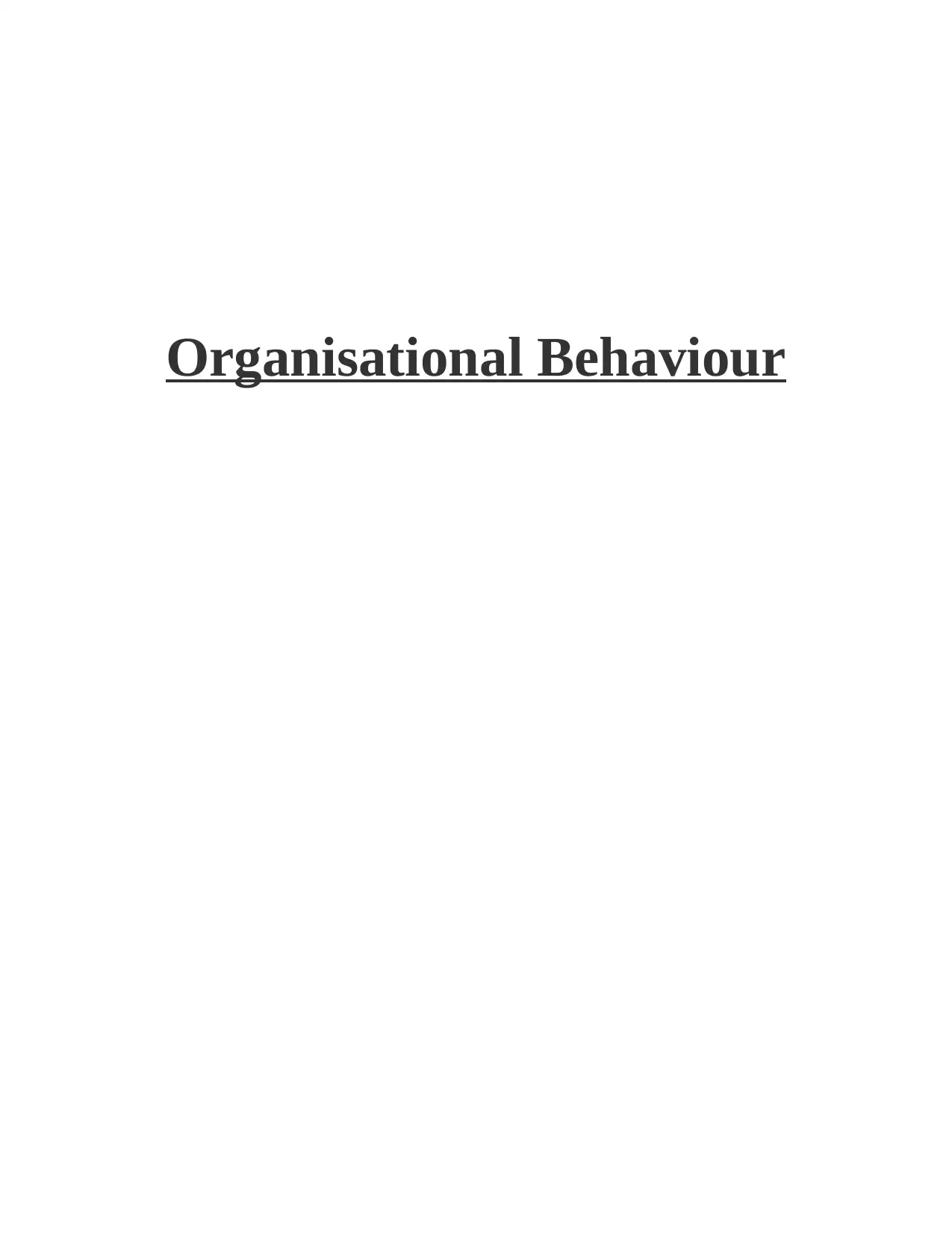
Organisational Behaviour
Paraphrase This Document
Need a fresh take? Get an instant paraphrase of this document with our AI Paraphraser
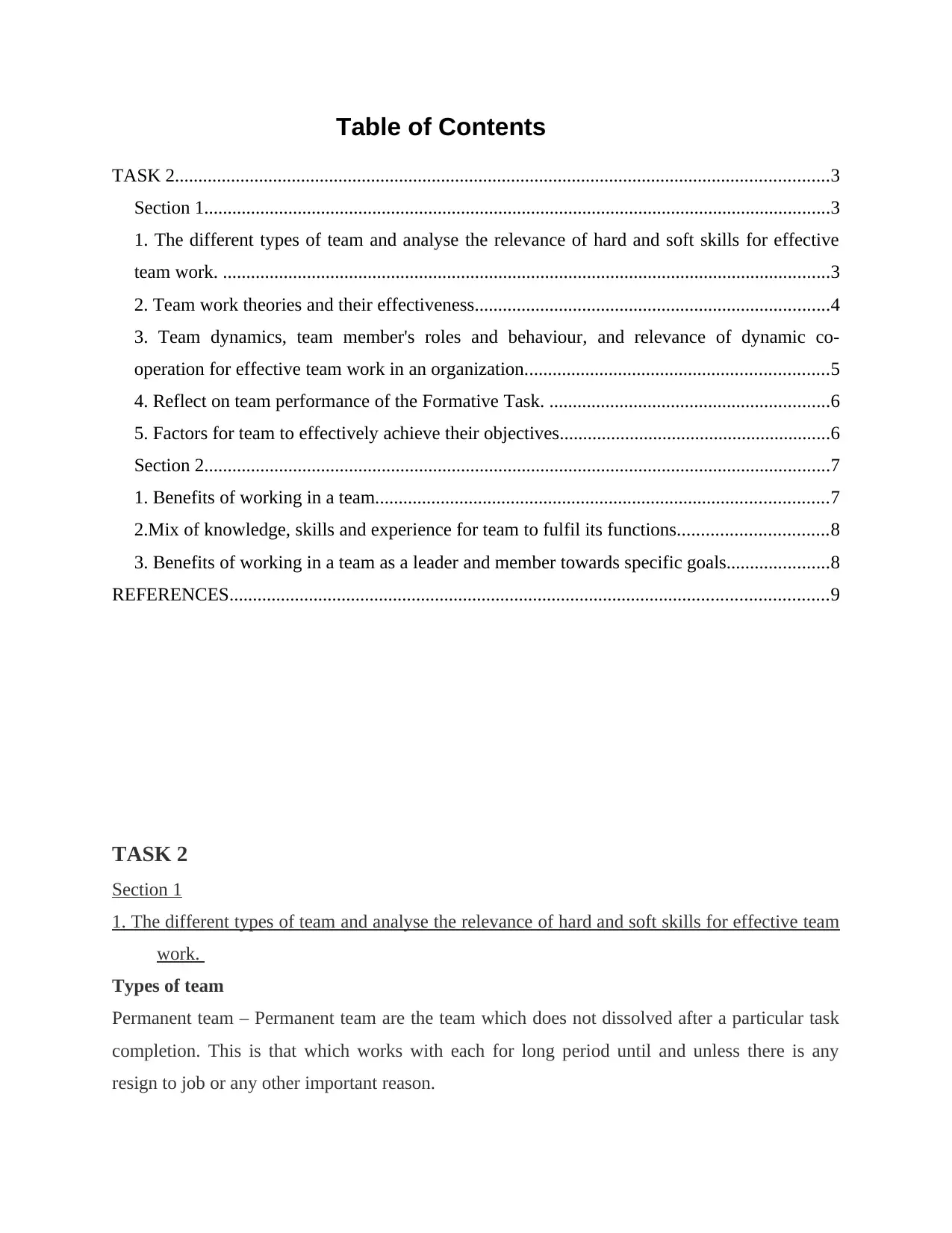
Table of Contents
TASK 2............................................................................................................................................3
Section 1......................................................................................................................................3
1. The different types of team and analyse the relevance of hard and soft skills for effective
team work. ..................................................................................................................................3
2. Team work theories and their effectiveness............................................................................4
3. Team dynamics, team member's roles and behaviour, and relevance of dynamic co-
operation for effective team work in an organization.................................................................5
4. Reflect on team performance of the Formative Task. ............................................................6
5. Factors for team to effectively achieve their objectives..........................................................6
Section 2......................................................................................................................................7
1. Benefits of working in a team.................................................................................................7
2.Mix of knowledge, skills and experience for team to fulfil its functions................................8
3. Benefits of working in a team as a leader and member towards specific goals......................8
REFERENCES................................................................................................................................9
TASK 2
Section 1
1. The different types of team and analyse the relevance of hard and soft skills for effective team
work.
Types of team
Permanent team – Permanent team are the team which does not dissolved after a particular task
completion. This is that which works with each for long period until and unless there is any
resign to job or any other important reason.
TASK 2............................................................................................................................................3
Section 1......................................................................................................................................3
1. The different types of team and analyse the relevance of hard and soft skills for effective
team work. ..................................................................................................................................3
2. Team work theories and their effectiveness............................................................................4
3. Team dynamics, team member's roles and behaviour, and relevance of dynamic co-
operation for effective team work in an organization.................................................................5
4. Reflect on team performance of the Formative Task. ............................................................6
5. Factors for team to effectively achieve their objectives..........................................................6
Section 2......................................................................................................................................7
1. Benefits of working in a team.................................................................................................7
2.Mix of knowledge, skills and experience for team to fulfil its functions................................8
3. Benefits of working in a team as a leader and member towards specific goals......................8
REFERENCES................................................................................................................................9
TASK 2
Section 1
1. The different types of team and analyse the relevance of hard and soft skills for effective team
work.
Types of team
Permanent team – Permanent team are the team which does not dissolved after a particular task
completion. This is that which works with each for long period until and unless there is any
resign to job or any other important reason.
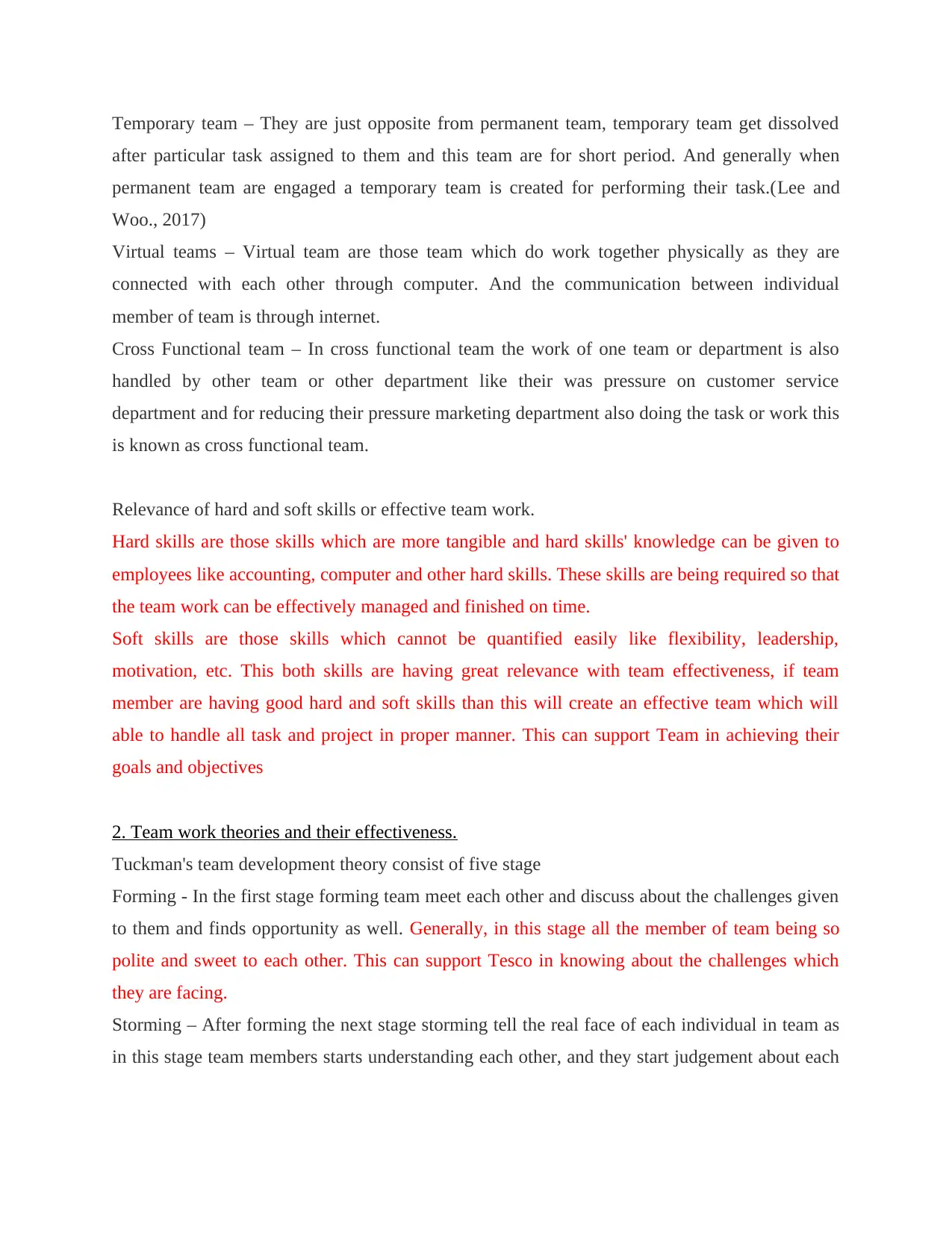
Temporary team – They are just opposite from permanent team, temporary team get dissolved
after particular task assigned to them and this team are for short period. And generally when
permanent team are engaged a temporary team is created for performing their task.(Lee and
Woo., 2017)
Virtual teams – Virtual team are those team which do work together physically as they are
connected with each other through computer. And the communication between individual
member of team is through internet.
Cross Functional team – In cross functional team the work of one team or department is also
handled by other team or other department like their was pressure on customer service
department and for reducing their pressure marketing department also doing the task or work this
is known as cross functional team.
Relevance of hard and soft skills or effective team work.
Hard skills are those skills which are more tangible and hard skills' knowledge can be given to
employees like accounting, computer and other hard skills. These skills are being required so that
the team work can be effectively managed and finished on time.
Soft skills are those skills which cannot be quantified easily like flexibility, leadership,
motivation, etc. This both skills are having great relevance with team effectiveness, if team
member are having good hard and soft skills than this will create an effective team which will
able to handle all task and project in proper manner. This can support Team in achieving their
goals and objectives
2. Team work theories and their effectiveness.
Tuckman's team development theory consist of five stage
Forming - In the first stage forming team meet each other and discuss about the challenges given
to them and finds opportunity as well. Generally, in this stage all the member of team being so
polite and sweet to each other. This can support Tesco in knowing about the challenges which
they are facing.
Storming – After forming the next stage storming tell the real face of each individual in team as
in this stage team members starts understanding each other, and they start judgement about each
after particular task assigned to them and this team are for short period. And generally when
permanent team are engaged a temporary team is created for performing their task.(Lee and
Woo., 2017)
Virtual teams – Virtual team are those team which do work together physically as they are
connected with each other through computer. And the communication between individual
member of team is through internet.
Cross Functional team – In cross functional team the work of one team or department is also
handled by other team or other department like their was pressure on customer service
department and for reducing their pressure marketing department also doing the task or work this
is known as cross functional team.
Relevance of hard and soft skills or effective team work.
Hard skills are those skills which are more tangible and hard skills' knowledge can be given to
employees like accounting, computer and other hard skills. These skills are being required so that
the team work can be effectively managed and finished on time.
Soft skills are those skills which cannot be quantified easily like flexibility, leadership,
motivation, etc. This both skills are having great relevance with team effectiveness, if team
member are having good hard and soft skills than this will create an effective team which will
able to handle all task and project in proper manner. This can support Team in achieving their
goals and objectives
2. Team work theories and their effectiveness.
Tuckman's team development theory consist of five stage
Forming - In the first stage forming team meet each other and discuss about the challenges given
to them and finds opportunity as well. Generally, in this stage all the member of team being so
polite and sweet to each other. This can support Tesco in knowing about the challenges which
they are facing.
Storming – After forming the next stage storming tell the real face of each individual in team as
in this stage team members starts understanding each other, and they start judgement about each
⊘ This is a preview!⊘
Do you want full access?
Subscribe today to unlock all pages.

Trusted by 1+ million students worldwide
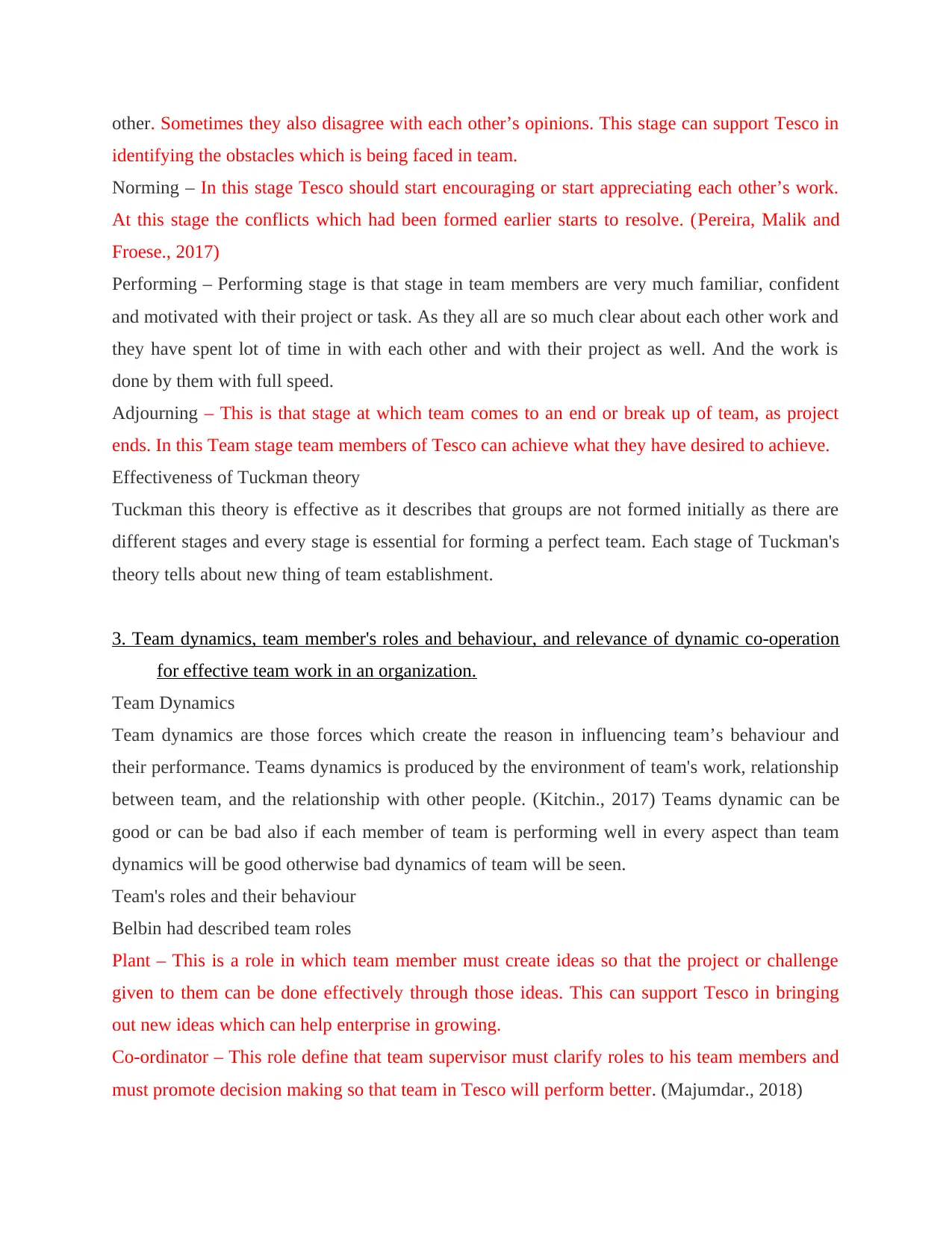
other. Sometimes they also disagree with each other’s opinions. This stage can support Tesco in
identifying the obstacles which is being faced in team.
Norming – In this stage Tesco should start encouraging or start appreciating each other’s work.
At this stage the conflicts which had been formed earlier starts to resolve. (Pereira, Malik and
Froese., 2017)
Performing – Performing stage is that stage in team members are very much familiar, confident
and motivated with their project or task. As they all are so much clear about each other work and
they have spent lot of time in with each other and with their project as well. And the work is
done by them with full speed.
Adjourning – This is that stage at which team comes to an end or break up of team, as project
ends. In this Team stage team members of Tesco can achieve what they have desired to achieve.
Effectiveness of Tuckman theory
Tuckman this theory is effective as it describes that groups are not formed initially as there are
different stages and every stage is essential for forming a perfect team. Each stage of Tuckman's
theory tells about new thing of team establishment.
3. Team dynamics, team member's roles and behaviour, and relevance of dynamic co-operation
for effective team work in an organization.
Team Dynamics
Team dynamics are those forces which create the reason in influencing team’s behaviour and
their performance. Teams dynamics is produced by the environment of team's work, relationship
between team, and the relationship with other people. (Kitchin., 2017) Teams dynamic can be
good or can be bad also if each member of team is performing well in every aspect than team
dynamics will be good otherwise bad dynamics of team will be seen.
Team's roles and their behaviour
Belbin had described team roles
Plant – This is a role in which team member must create ideas so that the project or challenge
given to them can be done effectively through those ideas. This can support Tesco in bringing
out new ideas which can help enterprise in growing.
Co-ordinator – This role define that team supervisor must clarify roles to his team members and
must promote decision making so that team in Tesco will perform better. (Majumdar., 2018)
identifying the obstacles which is being faced in team.
Norming – In this stage Tesco should start encouraging or start appreciating each other’s work.
At this stage the conflicts which had been formed earlier starts to resolve. (Pereira, Malik and
Froese., 2017)
Performing – Performing stage is that stage in team members are very much familiar, confident
and motivated with their project or task. As they all are so much clear about each other work and
they have spent lot of time in with each other and with their project as well. And the work is
done by them with full speed.
Adjourning – This is that stage at which team comes to an end or break up of team, as project
ends. In this Team stage team members of Tesco can achieve what they have desired to achieve.
Effectiveness of Tuckman theory
Tuckman this theory is effective as it describes that groups are not formed initially as there are
different stages and every stage is essential for forming a perfect team. Each stage of Tuckman's
theory tells about new thing of team establishment.
3. Team dynamics, team member's roles and behaviour, and relevance of dynamic co-operation
for effective team work in an organization.
Team Dynamics
Team dynamics are those forces which create the reason in influencing team’s behaviour and
their performance. Teams dynamics is produced by the environment of team's work, relationship
between team, and the relationship with other people. (Kitchin., 2017) Teams dynamic can be
good or can be bad also if each member of team is performing well in every aspect than team
dynamics will be good otherwise bad dynamics of team will be seen.
Team's roles and their behaviour
Belbin had described team roles
Plant – This is a role in which team member must create ideas so that the project or challenge
given to them can be done effectively through those ideas. This can support Tesco in bringing
out new ideas which can help enterprise in growing.
Co-ordinator – This role define that team supervisor must clarify roles to his team members and
must promote decision making so that team in Tesco will perform better. (Majumdar., 2018)
Paraphrase This Document
Need a fresh take? Get an instant paraphrase of this document with our AI Paraphraser
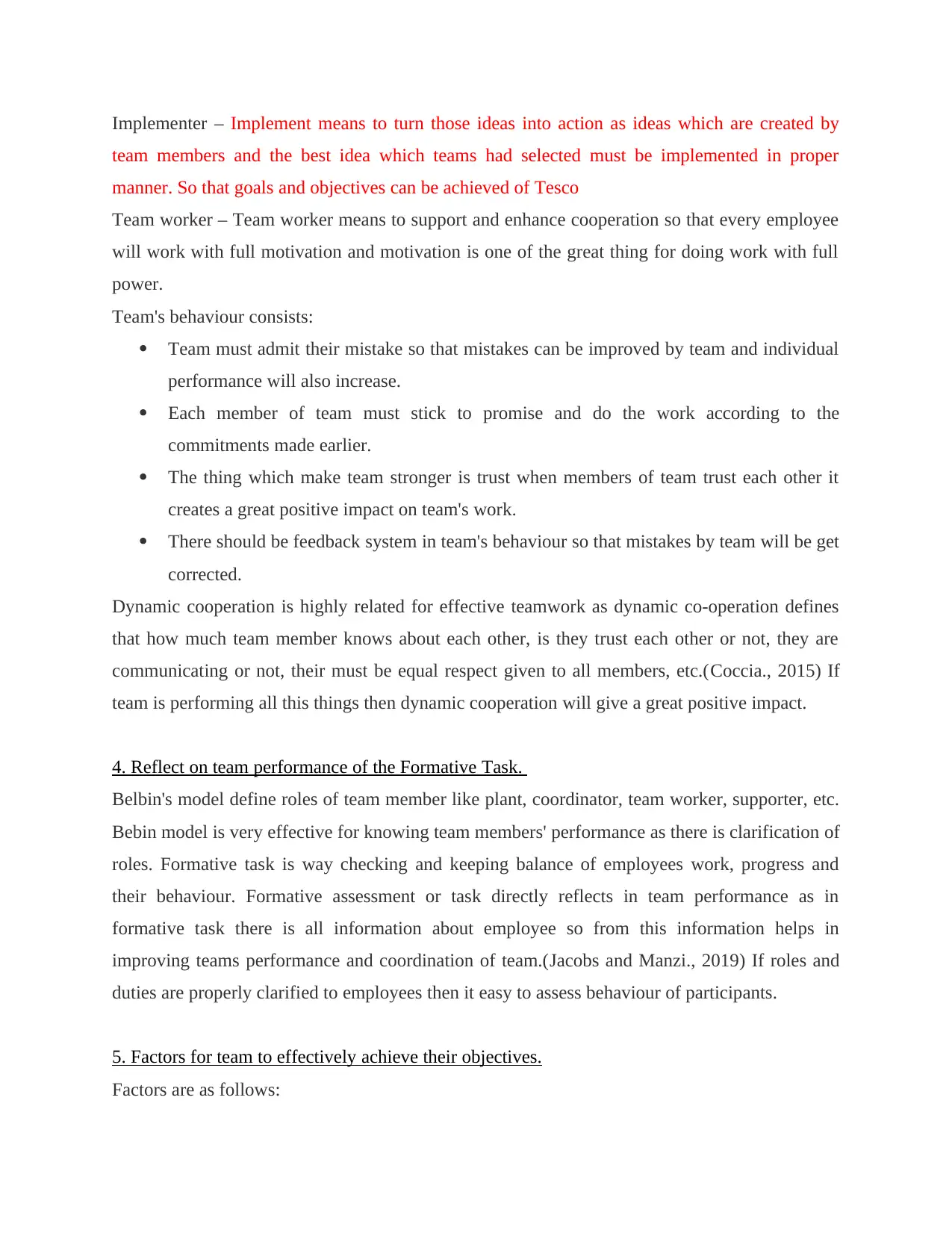
Implementer – Implement means to turn those ideas into action as ideas which are created by
team members and the best idea which teams had selected must be implemented in proper
manner. So that goals and objectives can be achieved of Tesco
Team worker – Team worker means to support and enhance cooperation so that every employee
will work with full motivation and motivation is one of the great thing for doing work with full
power.
Team's behaviour consists:
Team must admit their mistake so that mistakes can be improved by team and individual
performance will also increase.
Each member of team must stick to promise and do the work according to the
commitments made earlier.
The thing which make team stronger is trust when members of team trust each other it
creates a great positive impact on team's work.
There should be feedback system in team's behaviour so that mistakes by team will be get
corrected.
Dynamic cooperation is highly related for effective teamwork as dynamic co-operation defines
that how much team member knows about each other, is they trust each other or not, they are
communicating or not, their must be equal respect given to all members, etc.(Coccia., 2015) If
team is performing all this things then dynamic cooperation will give a great positive impact.
4. Reflect on team performance of the Formative Task.
Belbin's model define roles of team member like plant, coordinator, team worker, supporter, etc.
Bebin model is very effective for knowing team members' performance as there is clarification of
roles. Formative task is way checking and keeping balance of employees work, progress and
their behaviour. Formative assessment or task directly reflects in team performance as in
formative task there is all information about employee so from this information helps in
improving teams performance and coordination of team.(Jacobs and Manzi., 2019) If roles and
duties are properly clarified to employees then it easy to assess behaviour of participants.
5. Factors for team to effectively achieve their objectives.
Factors are as follows:
team members and the best idea which teams had selected must be implemented in proper
manner. So that goals and objectives can be achieved of Tesco
Team worker – Team worker means to support and enhance cooperation so that every employee
will work with full motivation and motivation is one of the great thing for doing work with full
power.
Team's behaviour consists:
Team must admit their mistake so that mistakes can be improved by team and individual
performance will also increase.
Each member of team must stick to promise and do the work according to the
commitments made earlier.
The thing which make team stronger is trust when members of team trust each other it
creates a great positive impact on team's work.
There should be feedback system in team's behaviour so that mistakes by team will be get
corrected.
Dynamic cooperation is highly related for effective teamwork as dynamic co-operation defines
that how much team member knows about each other, is they trust each other or not, they are
communicating or not, their must be equal respect given to all members, etc.(Coccia., 2015) If
team is performing all this things then dynamic cooperation will give a great positive impact.
4. Reflect on team performance of the Formative Task.
Belbin's model define roles of team member like plant, coordinator, team worker, supporter, etc.
Bebin model is very effective for knowing team members' performance as there is clarification of
roles. Formative task is way checking and keeping balance of employees work, progress and
their behaviour. Formative assessment or task directly reflects in team performance as in
formative task there is all information about employee so from this information helps in
improving teams performance and coordination of team.(Jacobs and Manzi., 2019) If roles and
duties are properly clarified to employees then it easy to assess behaviour of participants.
5. Factors for team to effectively achieve their objectives.
Factors are as follows:
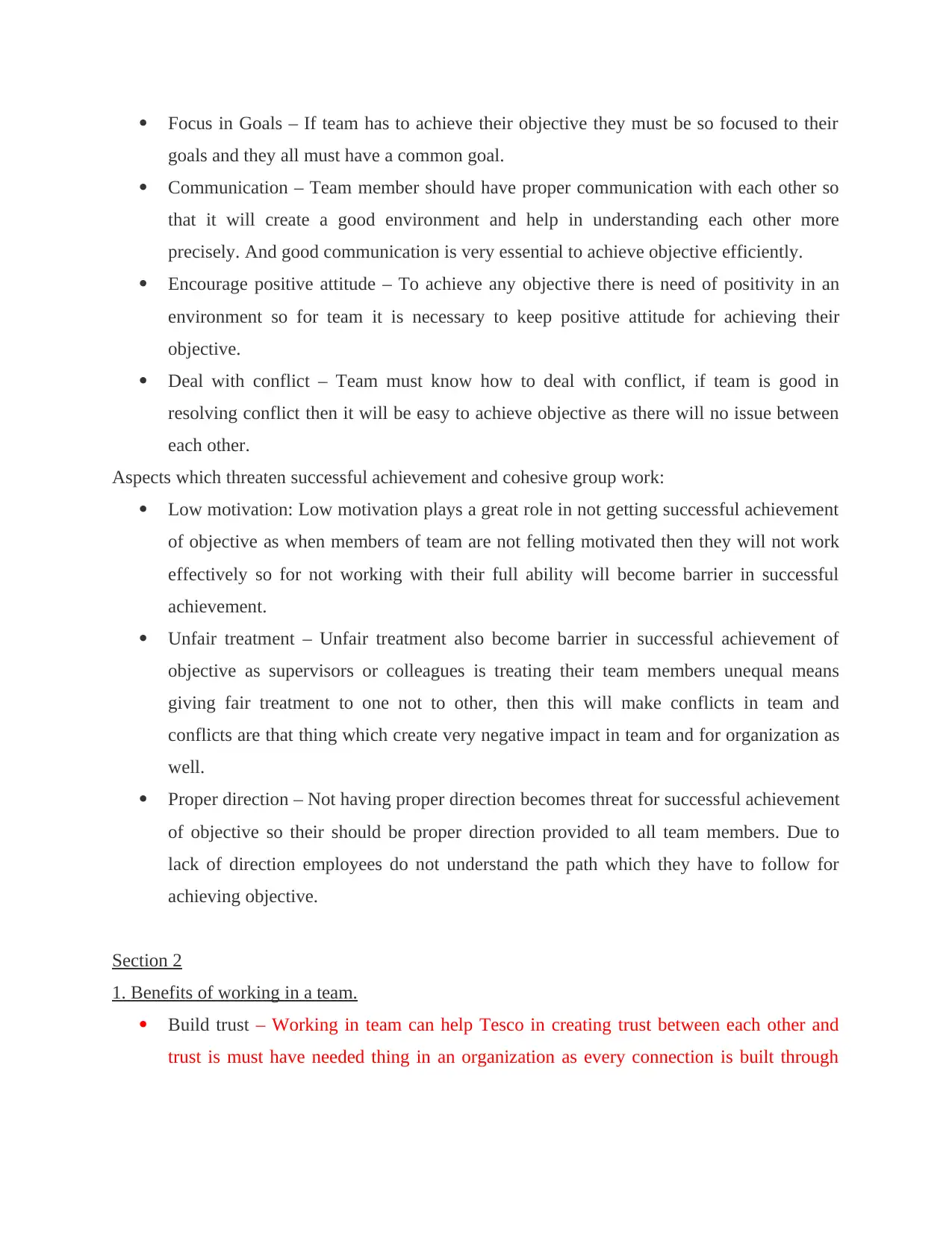
Focus in Goals – If team has to achieve their objective they must be so focused to their
goals and they all must have a common goal.
Communication – Team member should have proper communication with each other so
that it will create a good environment and help in understanding each other more
precisely. And good communication is very essential to achieve objective efficiently.
Encourage positive attitude – To achieve any objective there is need of positivity in an
environment so for team it is necessary to keep positive attitude for achieving their
objective.
Deal with conflict – Team must know how to deal with conflict, if team is good in
resolving conflict then it will be easy to achieve objective as there will no issue between
each other.
Aspects which threaten successful achievement and cohesive group work:
Low motivation: Low motivation plays a great role in not getting successful achievement
of objective as when members of team are not felling motivated then they will not work
effectively so for not working with their full ability will become barrier in successful
achievement.
Unfair treatment – Unfair treatment also become barrier in successful achievement of
objective as supervisors or colleagues is treating their team members unequal means
giving fair treatment to one not to other, then this will make conflicts in team and
conflicts are that thing which create very negative impact in team and for organization as
well.
Proper direction – Not having proper direction becomes threat for successful achievement
of objective so their should be proper direction provided to all team members. Due to
lack of direction employees do not understand the path which they have to follow for
achieving objective.
Section 2
1. Benefits of working in a team.
Build trust – Working in team can help Tesco in creating trust between each other and
trust is must have needed thing in an organization as every connection is built through
goals and they all must have a common goal.
Communication – Team member should have proper communication with each other so
that it will create a good environment and help in understanding each other more
precisely. And good communication is very essential to achieve objective efficiently.
Encourage positive attitude – To achieve any objective there is need of positivity in an
environment so for team it is necessary to keep positive attitude for achieving their
objective.
Deal with conflict – Team must know how to deal with conflict, if team is good in
resolving conflict then it will be easy to achieve objective as there will no issue between
each other.
Aspects which threaten successful achievement and cohesive group work:
Low motivation: Low motivation plays a great role in not getting successful achievement
of objective as when members of team are not felling motivated then they will not work
effectively so for not working with their full ability will become barrier in successful
achievement.
Unfair treatment – Unfair treatment also become barrier in successful achievement of
objective as supervisors or colleagues is treating their team members unequal means
giving fair treatment to one not to other, then this will make conflicts in team and
conflicts are that thing which create very negative impact in team and for organization as
well.
Proper direction – Not having proper direction becomes threat for successful achievement
of objective so their should be proper direction provided to all team members. Due to
lack of direction employees do not understand the path which they have to follow for
achieving objective.
Section 2
1. Benefits of working in a team.
Build trust – Working in team can help Tesco in creating trust between each other and
trust is must have needed thing in an organization as every connection is built through
⊘ This is a preview!⊘
Do you want full access?
Subscribe today to unlock all pages.

Trusted by 1+ million students worldwide
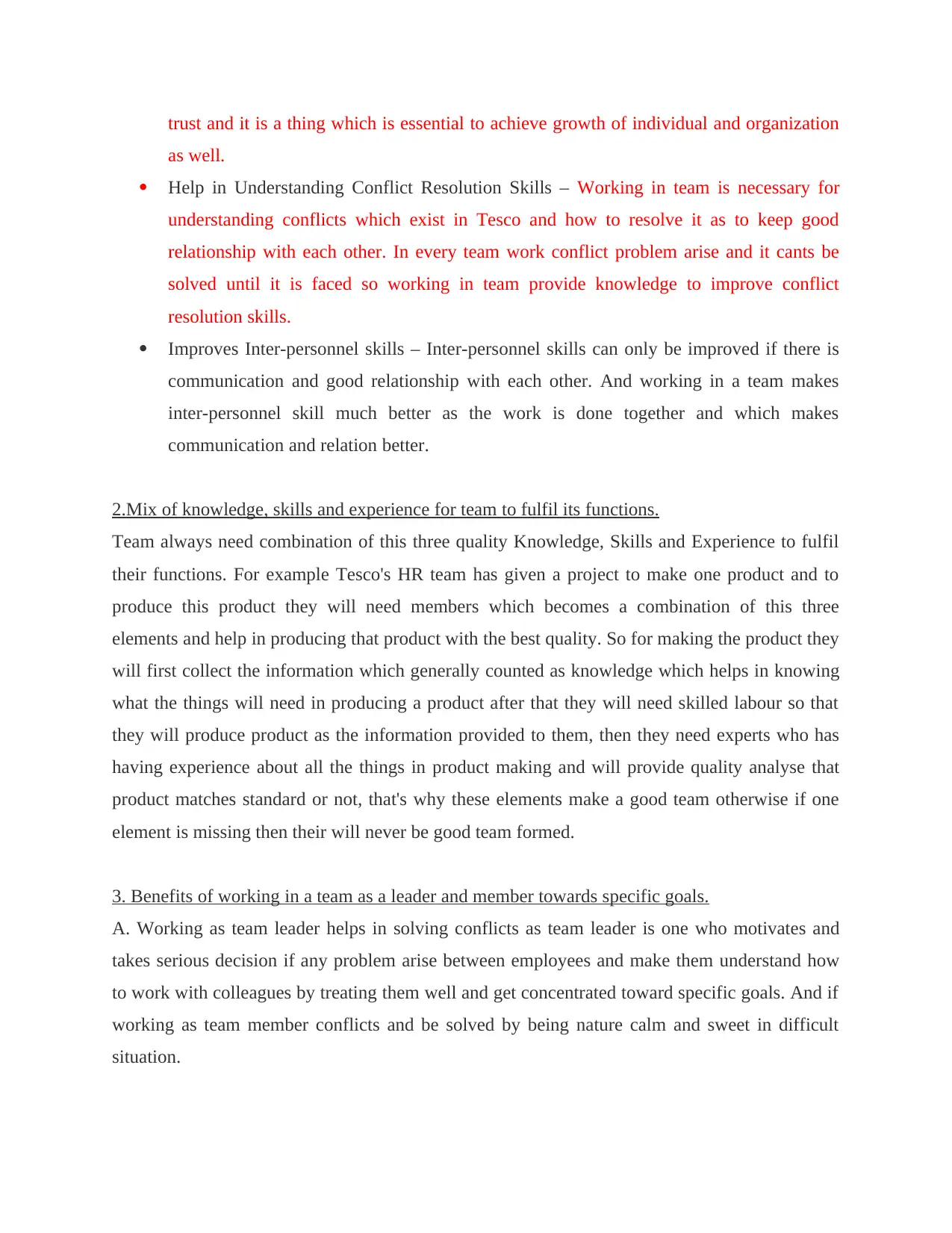
trust and it is a thing which is essential to achieve growth of individual and organization
as well.
Help in Understanding Conflict Resolution Skills – Working in team is necessary for
understanding conflicts which exist in Tesco and how to resolve it as to keep good
relationship with each other. In every team work conflict problem arise and it cants be
solved until it is faced so working in team provide knowledge to improve conflict
resolution skills.
Improves Inter-personnel skills – Inter-personnel skills can only be improved if there is
communication and good relationship with each other. And working in a team makes
inter-personnel skill much better as the work is done together and which makes
communication and relation better.
2.Mix of knowledge, skills and experience for team to fulfil its functions.
Team always need combination of this three quality Knowledge, Skills and Experience to fulfil
their functions. For example Tesco's HR team has given a project to make one product and to
produce this product they will need members which becomes a combination of this three
elements and help in producing that product with the best quality. So for making the product they
will first collect the information which generally counted as knowledge which helps in knowing
what the things will need in producing a product after that they will need skilled labour so that
they will produce product as the information provided to them, then they need experts who has
having experience about all the things in product making and will provide quality analyse that
product matches standard or not, that's why these elements make a good team otherwise if one
element is missing then their will never be good team formed.
3. Benefits of working in a team as a leader and member towards specific goals.
A. Working as team leader helps in solving conflicts as team leader is one who motivates and
takes serious decision if any problem arise between employees and make them understand how
to work with colleagues by treating them well and get concentrated toward specific goals. And if
working as team member conflicts and be solved by being nature calm and sweet in difficult
situation.
as well.
Help in Understanding Conflict Resolution Skills – Working in team is necessary for
understanding conflicts which exist in Tesco and how to resolve it as to keep good
relationship with each other. In every team work conflict problem arise and it cants be
solved until it is faced so working in team provide knowledge to improve conflict
resolution skills.
Improves Inter-personnel skills – Inter-personnel skills can only be improved if there is
communication and good relationship with each other. And working in a team makes
inter-personnel skill much better as the work is done together and which makes
communication and relation better.
2.Mix of knowledge, skills and experience for team to fulfil its functions.
Team always need combination of this three quality Knowledge, Skills and Experience to fulfil
their functions. For example Tesco's HR team has given a project to make one product and to
produce this product they will need members which becomes a combination of this three
elements and help in producing that product with the best quality. So for making the product they
will first collect the information which generally counted as knowledge which helps in knowing
what the things will need in producing a product after that they will need skilled labour so that
they will produce product as the information provided to them, then they need experts who has
having experience about all the things in product making and will provide quality analyse that
product matches standard or not, that's why these elements make a good team otherwise if one
element is missing then their will never be good team formed.
3. Benefits of working in a team as a leader and member towards specific goals.
A. Working as team leader helps in solving conflicts as team leader is one who motivates and
takes serious decision if any problem arise between employees and make them understand how
to work with colleagues by treating them well and get concentrated toward specific goals. And if
working as team member conflicts and be solved by being nature calm and sweet in difficult
situation.
Paraphrase This Document
Need a fresh take? Get an instant paraphrase of this document with our AI Paraphraser
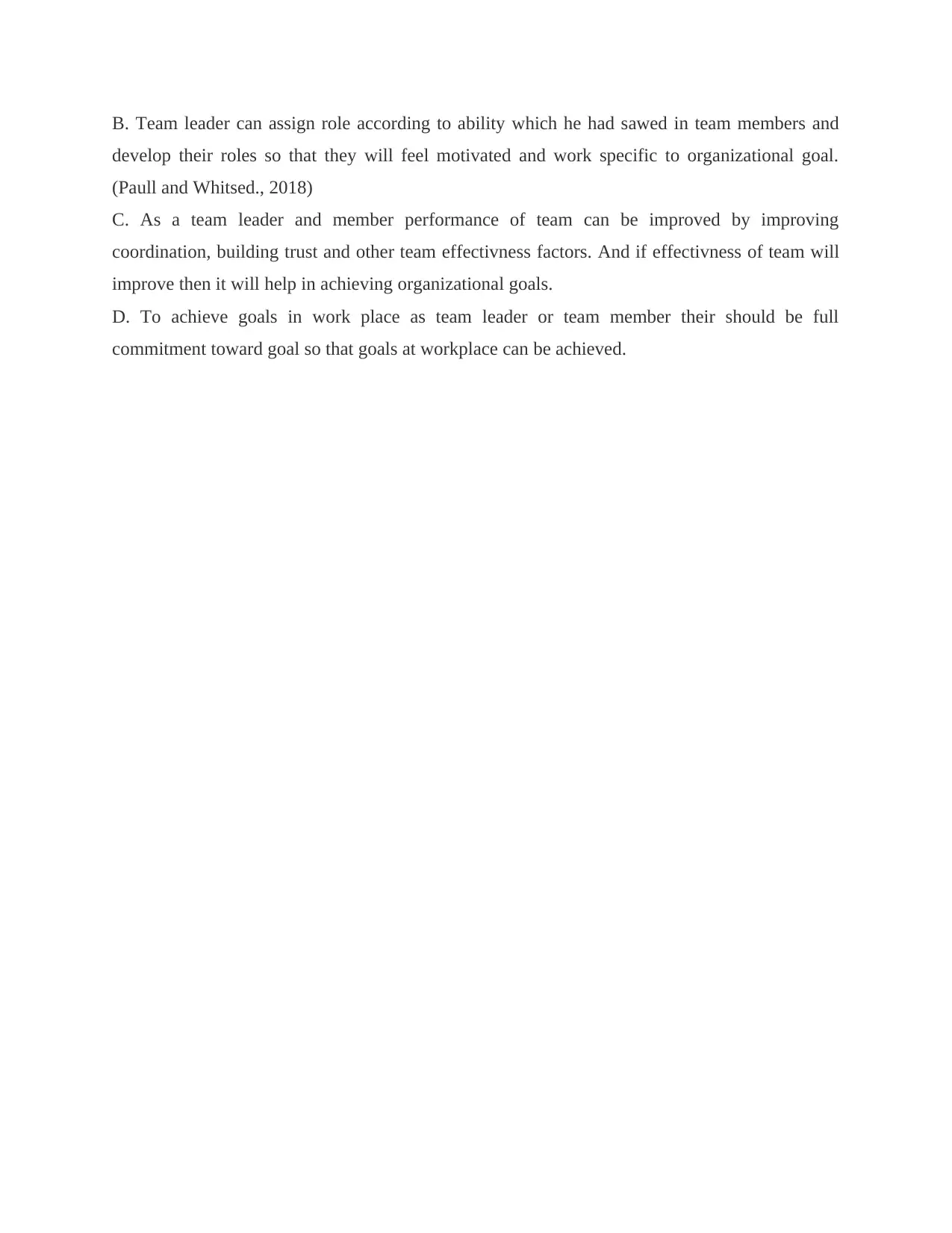
B. Team leader can assign role according to ability which he had sawed in team members and
develop their roles so that they will feel motivated and work specific to organizational goal.
(Paull and Whitsed., 2018)
C. As a team leader and member performance of team can be improved by improving
coordination, building trust and other team effectivness factors. And if effectivness of team will
improve then it will help in achieving organizational goals.
D. To achieve goals in work place as team leader or team member their should be full
commitment toward goal so that goals at workplace can be achieved.
develop their roles so that they will feel motivated and work specific to organizational goal.
(Paull and Whitsed., 2018)
C. As a team leader and member performance of team can be improved by improving
coordination, building trust and other team effectivness factors. And if effectivness of team will
improve then it will help in achieving organizational goals.
D. To achieve goals in work place as team leader or team member their should be full
commitment toward goal so that goals at workplace can be achieved.
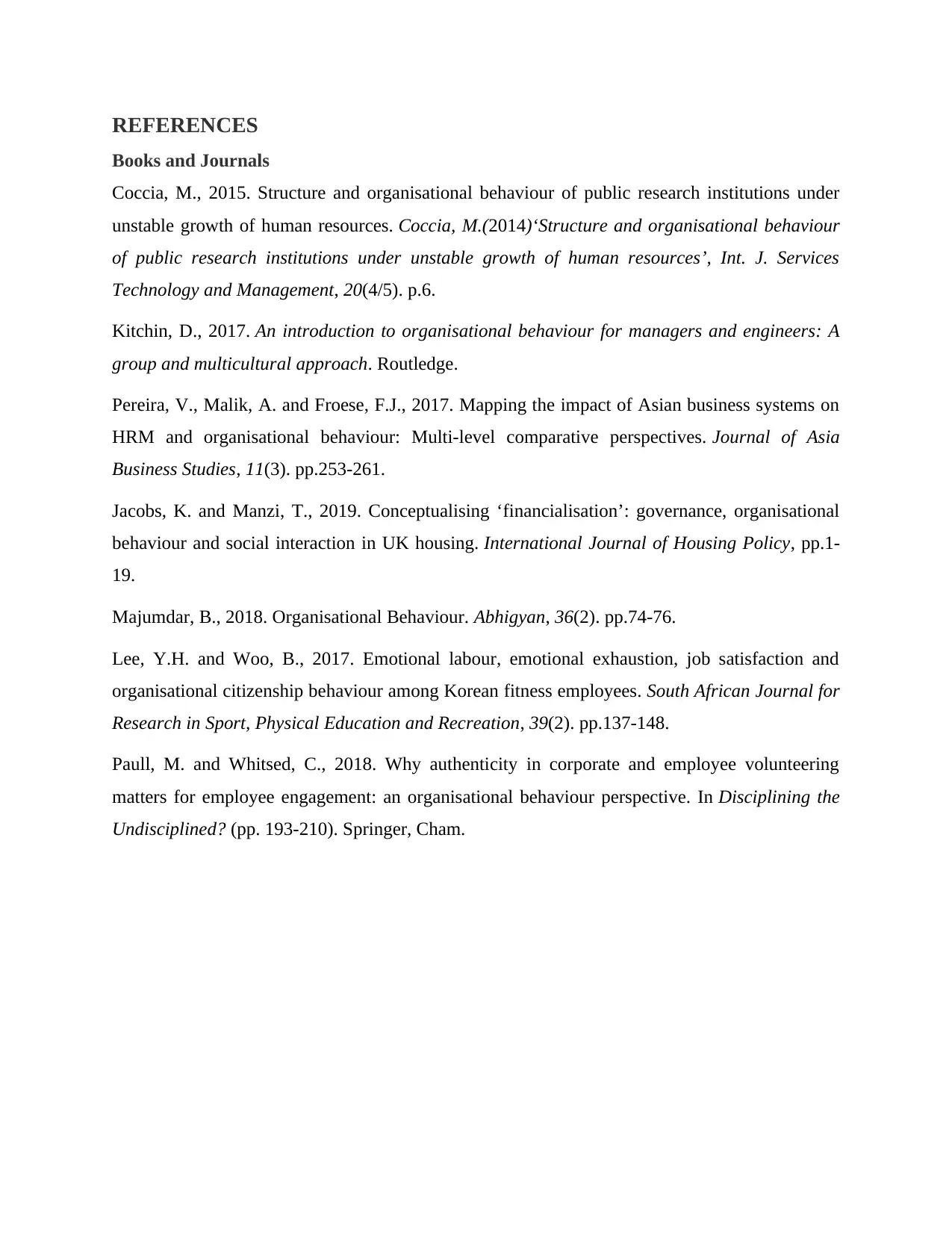
REFERENCES
Books and Journals
Coccia, M., 2015. Structure and organisational behaviour of public research institutions under
unstable growth of human resources. Coccia, M.(2014)‘Structure and organisational behaviour
of public research institutions under unstable growth of human resources’, Int. J. Services
Technology and Management, 20(4/5). p.6.
Kitchin, D., 2017. An introduction to organisational behaviour for managers and engineers: A
group and multicultural approach. Routledge.
Pereira, V., Malik, A. and Froese, F.J., 2017. Mapping the impact of Asian business systems on
HRM and organisational behaviour: Multi-level comparative perspectives. Journal of Asia
Business Studies, 11(3). pp.253-261.
Jacobs, K. and Manzi, T., 2019. Conceptualising ‘financialisation’: governance, organisational
behaviour and social interaction in UK housing. International Journal of Housing Policy, pp.1-
19.
Majumdar, B., 2018. Organisational Behaviour. Abhigyan, 36(2). pp.74-76.
Lee, Y.H. and Woo, B., 2017. Emotional labour, emotional exhaustion, job satisfaction and
organisational citizenship behaviour among Korean fitness employees. South African Journal for
Research in Sport, Physical Education and Recreation, 39(2). pp.137-148.
Paull, M. and Whitsed, C., 2018. Why authenticity in corporate and employee volunteering
matters for employee engagement: an organisational behaviour perspective. In Disciplining the
Undisciplined? (pp. 193-210). Springer, Cham.
Books and Journals
Coccia, M., 2015. Structure and organisational behaviour of public research institutions under
unstable growth of human resources. Coccia, M.(2014)‘Structure and organisational behaviour
of public research institutions under unstable growth of human resources’, Int. J. Services
Technology and Management, 20(4/5). p.6.
Kitchin, D., 2017. An introduction to organisational behaviour for managers and engineers: A
group and multicultural approach. Routledge.
Pereira, V., Malik, A. and Froese, F.J., 2017. Mapping the impact of Asian business systems on
HRM and organisational behaviour: Multi-level comparative perspectives. Journal of Asia
Business Studies, 11(3). pp.253-261.
Jacobs, K. and Manzi, T., 2019. Conceptualising ‘financialisation’: governance, organisational
behaviour and social interaction in UK housing. International Journal of Housing Policy, pp.1-
19.
Majumdar, B., 2018. Organisational Behaviour. Abhigyan, 36(2). pp.74-76.
Lee, Y.H. and Woo, B., 2017. Emotional labour, emotional exhaustion, job satisfaction and
organisational citizenship behaviour among Korean fitness employees. South African Journal for
Research in Sport, Physical Education and Recreation, 39(2). pp.137-148.
Paull, M. and Whitsed, C., 2018. Why authenticity in corporate and employee volunteering
matters for employee engagement: an organisational behaviour perspective. In Disciplining the
Undisciplined? (pp. 193-210). Springer, Cham.
⊘ This is a preview!⊘
Do you want full access?
Subscribe today to unlock all pages.

Trusted by 1+ million students worldwide
1 out of 9
Related Documents
Your All-in-One AI-Powered Toolkit for Academic Success.
+13062052269
info@desklib.com
Available 24*7 on WhatsApp / Email
![[object Object]](/_next/static/media/star-bottom.7253800d.svg)
Unlock your academic potential
Copyright © 2020–2025 A2Z Services. All Rights Reserved. Developed and managed by ZUCOL.





